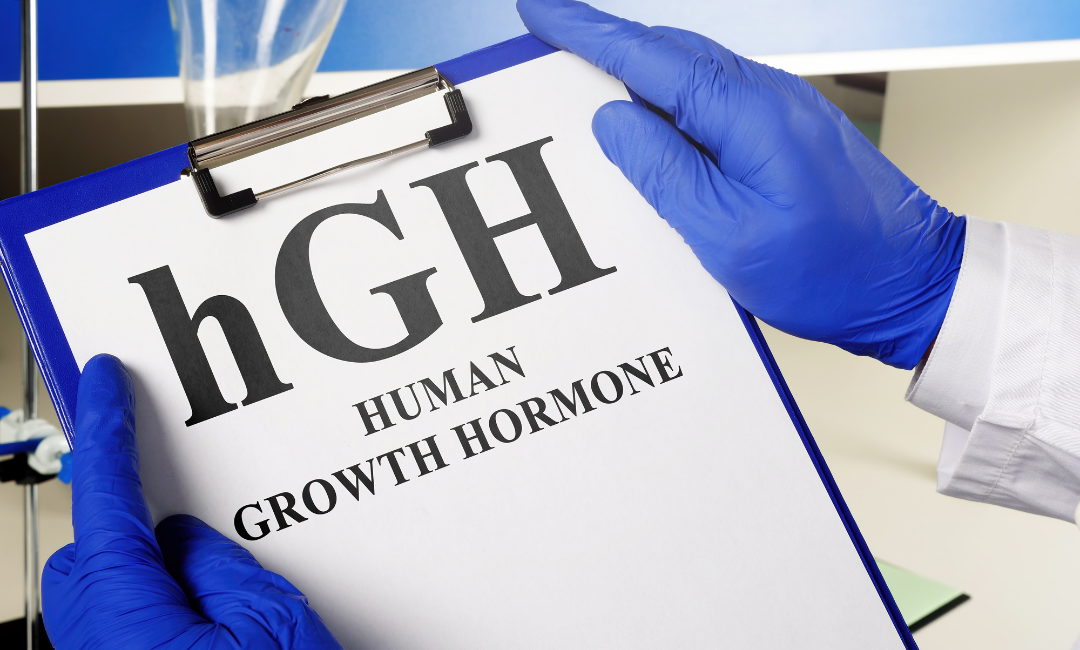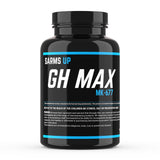How to Increase Human Growth Hormone NATURALLY
Forget those shady supplements promising overnight muscle miracles. Turns out, boosting your Human Growth Hormone (HGH) levels is all about mastering the basics. Think deep sleep, smart workouts, and dialed-in nutrition – not weird injections.
Ready to unlock better health, a leaner body, and a sharper mind? Here's what we'll cover:
-
The lowdown on HGH: What it is, why it matters
-
9 natural strategies: Simple tweaks that make a major difference in hormone production
-
The power of timing: When to eat, sleep, and train for maximum HGH impact
What's the Big Deal with HGH?
Human Growth Hormone (HGH), also known as somatotropin, is a protein-based hormone produced by your pituitary gland. It's a major player in many bodily functions, but you might know it best for its role in growth and development. Let's break it down:
-
The childhood years: HGH is your body's growth engine, fueling those epic growth spurts of your youth.
-
Adulthood and beyond: Don't think it checks out when you hit 18. HGH continues to support healthy metabolism, muscle mass, bone density, and even your mood.
-
The not-so-fun decline: As you age, adult growth hormone deficiency naturally takes a rise. This slowdown contributes to less muscle, more body fat, and a higher risk of health issues.
The good news? You can influence those HGH levels. By understanding what makes this hormone tick, you can make simple lifestyle changes with big payoffs.
Why HGH Matters: The Benefits
Think of HGH as your body's internal fountain of youth. Optimized levels have a whole host of benefits, including:
-
Muscle growth and maintenance: HGH is a superhero for your muscles. It stimulates protein synthesis, the process by which your body builds and repairs muscle tissue. This translates to better results from your workouts, increased strength, and improved endurance.
-
Body composition: HGH flips the switch on fat storage, promoting lipolysis, the breakdown of fat for fuel. This can lead to a leaner physique, decrease body fat, and a more toned appearance.
-
Bone health: Strong bones are essential for a healthy life, and HGH plays a critical role in keeping them that way. It stimulates the production of collagen, a key component of bone, and increases bone mineral density. This reduces your risk of fractures and osteoporosis, keeping you active and independent as you age.
-
Improved energy: Feeling sluggish and dragging yourself through the day? Balanced HGH levels can be a game-changer. HGH helps regulate blood sugar levels, which can lead to more stable energy throughout the day. Plus, it may improve insulin sensitivity, allowing your body to use energy from food more efficiently. Say goodbye to afternoon slumps and hello to sustained energy.
-
Sleep quality: A good night's sleep is essential for overall health and well-being, and HGH plays a role in that too. During deep sleep, your body releases growth hormone. Optimizing HGH levels can promote deeper, more restorative sleep, leaving you feeling refreshed and energized the next day.
-
Mental sharpness: Research suggests that HGH may also have cognitive benefits. It may improve focus, memory, and overall cognitive function. Some studies even suggest it may play a role in protecting against neurodegenerative diseases.
-
Overall well-being: HGH's effects go far beyond building muscle and burning fat. It's a behind-the-scenes superstar for a healthier you. HGH supports a healthy immune system, promotes healthy skin, and may even improve heart health. By optimizing HGH levels, you're investing in your overall well-being for a healthier, happier you.
9 Natural Ways to Boost Your HGH

Forget about quick fixes and focus on your daily habits. By making smart lifestyle choices, you can give your body the natural nudge it needs to increase recombinant human growth hormone production. Here's your roadmap to HGH optimization:
1. Prioritize Sleep
Your nightly slumber is a goldmine for HGH production, but it's not just about quantity, it's about quality. Here's how to optimize your sleep environment for maximum HGH benefit:
-
Darkness is your friend: Light exposure, especially blue light emitted from electronics, can suppress HGH release. Create a sleep sanctuary by turning off screens at least an hour before bed and ensuring your bedroom is dark and free of light pollution. Invest in blackout curtains or an eye mask if necessary.
-
Temperature matters: A cool room is ideal for sleep. Aim for a temperature between 60-67 degrees Fahrenheit (15.5-19.4 degrees Celsius) for optimal HGH production and overall sleep quality.
-
Silence or soothing sounds: Noise can disrupt sleep cycles and HGH release. If you live in a noisy area, consider using earplugs or a white noise machine to create a calming sleep environment.
-
Power down before bed: Avoid stimulating activities like watching TV, working on your computer, or checking social media close to bedtime. These activities can rev up your brain and make it harder to fall asleep and transition into deep sleep stages where HGH is released. Opt for relaxing activities like reading a book, taking a warm bath, or practicing light stretches or meditation.
-
Create a consistent sleep schedule: Go to bed and wake up around the same time each day, even on weekends. This helps regulate your body's natural sleep-wake cycle, promoting deeper sleep and potentially boosting HGH levels.
2. Exercise Intelligently
Exercise is a phenomenal way to kickstart HGH production. But not all workouts are created equal. Here's how to get the most bang for your buck:
-
Intensity rules: High-intensity exercise like weightlifting, sprinting, and HIIT (High-Intensity Interval Training)create a greater metabolic demand, leading to a more significant surge in HGH levels.
-
Keep it short and sweet: Focus on shorter, intense sessions rather than long, low-intensity cardio sessions. Your body will release more HGH in these powerful bursts of activity.
-
Mix it up: Challenge your body by incorporating different forms of exercise into your routine. This prevents plateaus and promotes overall fitness, which is crucial for a healthy HGH response.
-
Rest and recover: It's important to give your body time to rest and recover between workouts. Overtraining can suppress HGH levels, so build rest days into your training plan.
3. Optimize Your Nutrition
What you put on your plate plays a huge role in regulating your hormones, including HGH. Here's how to fuel your body for maximum HGH output:
-
Get your protein fix: Protein is the building block of muscle tissue, and it also stimulates HGH release. Aim for at least 1 gram of protein per kilogram of body weight each day, spread out evenly throughout your meals. Choose high-quality sources like lean meats, poultry, fish, eggs, beans, and whole grains.
-
Timing matters: Consuming a small protein-rich meal or snack shortly before bed can boost HGH production overnight. Try a handful of nuts, a serving of Greek yogurt, or a protein shake.
-
Don't fear healthy fats: Fats play a role in hormone production. Opt for healthy fats like olive oil, avocado, nuts, and fatty fish while limiting unhealthy saturated and trans fats, which can hinder HGH release.
-
Manage your sugar intake: Excessive sugar intake can disrupt insulin levels and suppress HGH production. Reduce your intake of processed foods, sugary drinks, and refined carbohydrates. Prioritize whole, unprocessed foods for a more balanced diet.
4. Consider Natural Supplements (With Caution)
Several natural supplements claim to support HGH production. Here's a breakdown of some common options:
-
L-Arginine: These amino acids may stimulate HGH release, though studies show mixed results. Its effects may be more pronounced when combined with exercise.
-
L-Glutamine: Glutamine is another amino acid that may have a modest impact on HGH levels during workouts.
-
Melatonin: This sleep hormone not only helps you snooze but also plays a role in regulating HGH. Taking a melatonin supplement before bed may aid sleep and indirectly support HGH release.
-
GABA: Gamma-Aminobutyric Acid (GABA) is a neurotransmitter that could potentially increase HGH levels, especially after exercise. However, more research is needed in this area.
Products like MK-677 are synthetic secretagogues. They mimic the action of the hormone ghrelin, which triggers the release of growth hormone. Studies suggest MK-677 can increase HGH levels, leading to benefits like improved muscle mass, reduced body fat, and better sleep. However, more research is needed to confirm these long-term effects.

Important Notes:
Always talk to your doctor before trying any supplements.
Research specific brands and their reputation – not all supplements are created equal.
Start with a low dose and monitor how your body responds.
Don't expect miracles – supplements can be a helpful piece of the puzzle but aren't a magic solution.
5. Cut Back on Sugar: It's Sabotaging Your HGH
Excess sugar in your diet wreaks havoc on your hormones, HGH included. Here's why reducing your intake is crucial:
-
Insulin spikes and crashes: Sugary foods cause rapid spikes in your blood sugar levels and then insulin, the hormone that regulates blood sugar, kicks in. This roller coaster ride can throw off HGH production.
-
Fat storage increase: When insulin levels are consistently elevated, your body shifts into fat-storage mode rather than fat-burning mode. Less fat burning and more storage can counteract the potential benefits of HGH, which aids in fat loss.
-
Inflammation: Chronic sugar consumption can lead to inflammation throughout your body. Inflammation suppresses HGH production, creating an unhealthy cycle.
How to Win the Sugar Battle
-
Read food labels carefully: Sugar hides in all sorts of sneaky places, from sauces and salad dressings to so-called "healthy" snacks. Become a label detective to spot added sugars.
-
Choose wisely: Replace sugary drinks with unsweetened tea, coffee, or sparkling water.
-
Go for the natural sweetness: Opt for whole fruits rich in fiber, vitamins, and antioxidants, which provide natural sweetness without adverse effects.
-
Be mindful of sweeteners: Even artificial sweeteners can disrupt your gut health and possibly mess with your insulin response, so use them sparingly or avoid them altogether.
6. Give Intermittent Fasting a Try
Intermittent fasting (IF) involves alternating between periods of eating and fasting. It's gained popularity, and research suggests it might be an effective tool for optimizing HGH levels. Here's how it works:
-
The HGH Boost: Fasting periods naturally increase human growth hormone secretion. One study found that a 24-hour fast boosted HGH levels by a whopping 5-fold.
-
Reduced insulin levels: Fasting gives your insulin levels a break, which is beneficial for overall hormonal balance and HGH production.
-
Improved fat burning: IF can enhance your body's ability to use stored fat for energy, contributing to a leaner body composition – a bonus for healthy HGH function.
Popular IF Methods
-
16/8 method: This involves eating within an 8-hour window and fasting for the remaining 16 hours of the day. Many people find this approach sustainable and easy to incorporate into their lifestyle.
-
5:2 method: This method involves restricting your calorie intake significantly for two days a week while eating normally on the other five days.
7. Manage Stress: It's a Silent HGH Killer

Chronic stress has far-reaching negative effects on your health, and HGH production is no exception. When you're constantly in fight-or-flight mode, your body prioritizes the production of cortisol (the stress hormone) over HGH. Here's how to fight back:
-
Identify your stressors: Take some time to reflect on what causes you the most stress in your daily life. Once you're aware, you can start developing strategies to manage them.
-
Implement relaxation techniques: Deep breathing exercises, meditation, yoga, or spending time in nature can help to quiet your mind and reduce stress levels.
-
Prioritize sleep: We already discussed how important sleep is for HGH, but it's also crucial for managing stress. Aim for 6-7 hours of quality sleep each night.
-
Seek professional help: If you struggle with chronic stress or anxiety, consider seeking therapy or counseling for additional support and coping mechanisms.
8. Don't Skimp on Healthy Fats
Contrary to what old diet fads might have you believe, fats are essential for a healthy body, including optimized HGH levels. Here's the scoop:
-
Hormone building blocks: Your body needs fats to produce hormones, including HGH.
-
Focus on the right ones: Prioritize healthy fats like those found in olive oil, avocados, nuts, seeds, and fatty fish. Limit unhealthy saturated and trans fats commonly found in processed foods.
-
Support overall health: Healthy fats promote heart health, brain function, and keep you feeling full and satisfied, which can help control those pesky sugar cravings that disrupt HGH.
9. Eat Less Before Bedtime: Curb Late-Night Snacking
Late-night munching can be a major disruptor to your HGH production and overall sleep quality. Here's why and what you can do:
-
The Digestion Factor: When you eat close to bedtime, your body is focused on digestion rather than the deep, restful sleep necessary for HGH release.
-
Insulin Spikes: Late-night snacks, especially those high in sugar or refined carbs, can cause insulin spikes, throwing your hormonal balance off and suppressing HGH production.
-
Light and early dinners: Aim to have your last meal of the day a few hours before bedtime. Choose a light, easy-to-digest meal to promote restful sleep.
-
Smart swaps: If you feel the urge to snack before bed, swap sugary or processed options with healthier choices like a handful of nuts, a piece of fruit, or a small cup of Greek yogurt.
Bonus Tip: Combine this strategy with a relaxing bedtime routine to wind down and promote better sleep. This might include taking a warm bath, reading a book, or practicing some light meditation.
Get Ready to Optimize Your HGH and Your Health
You've got the knowledge—now it's time for action. By making small, sustainable changes to your sleep, exercise, diet, and lifestyle habits, you're giving your body the support it needs to naturally produce higher human growth hormone levels for a healthier, more energized you.
Here's a quick recap of your key takeaways:
-
Prioritize sleep quality and quantity
-
Exercise with intensity and smart recovery practices
-
Fuel your body with protein, healthy fats, and whole foods
-
Curb sugar cravings
-
Explore natural supplements (talk to your doctor first)
-
Try intermittent fasting
-
Manage stress effectively
-
Eat less before bedtime.
Feel your best with a little help from SARMS UP
Ready to take your human growth hormone (HGH) optimization and results to the next level? SARMS UP offers high-quality SARMs (Selective Androgen Receptor Modulators), designed to support your fitness goals and overall well-being. We prioritize purity, customer care, and delivering the best quality products on the market. Discover the difference SARMS UP can make in your journey toward optimal health and performance.
FAQs: Answers to Your Burning HGH Questions
How can I increase my HGH levels fast?
There are no overnight fixes when it comes to boost human growth hormone. The healthiest, most effective approach to deal with growth hormone deficiency involves focusing on long-term changes to your lifestyle, including optimizing your sleep, exercise habits, and diet.
How do you increase human growth hormone naturally?
Here are the key strategies:
-
Prioritize sleep: Get 7-8 hours of quality sleep each night.
-
Exercise intelligently: Incorporate high-intensity workouts.
-
Optimize nutrition: Focus on whole foods, protein, and healthy fats.
-
Manage stress levels: Practice relaxation techniques
-
Consider intermittent fasting: Give your body a break from digesting
-
Limit sugar and late-night eating
What foods increase growth hormone levels?
No single food magically boosts HGH, but here's how to fuel yourself right:
-
Protein sources: Lean meats, poultry, fish, eggs, beans, and whole grains.
-
Healthy fats: Avocados, nuts, seeds, and fatty fish.
-
Fiber-rich fruits and vegetables: These promote overall health and hormonal balance.
What vitamins increase human growth hormone?
There's limited evidence that specific vitamins directly boost HGH. However, ensuring you're not deficient in essential vitamins like Vitamin D can support overall health and hormone function. Always talk to your doctor about supplements.


